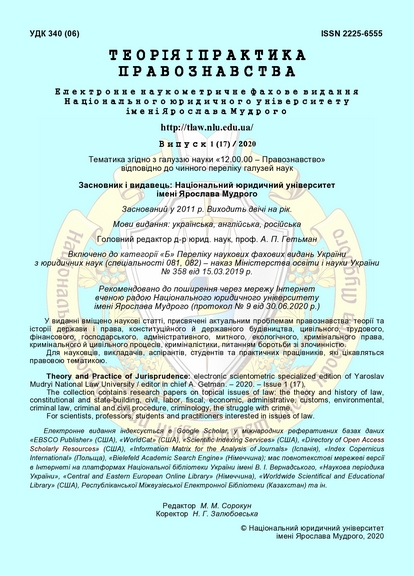Scientific and technical support for investigative activities: content and directions
DOI:
https://doi.org/10.21564/2225-6555.2020.17.206512Keywords:
scientific and technical support, new technologies, pre-trial investigation authorities, investigative activityAbstract
The article is devoted to the problem of scientific and technical support for investigative activities, the relevance of the study of which is due to the fact that the accelerated development of technology significantly changes the methods and means of committing crimes and also expands the space for illegal activities. In this regard, the issue of innovative re-equipment of investigative activities, narrowing the gap between the possibilities of the results of scientific and technological achievements and the actual practice of their use by representatives of law enforcement agencies, is an acute issue. Therefore, the identification of promising areas of integration into the investigative activities of the latest scientific and technical means and technologies that ensure its effectiveness and compliance with the modern needs of judicial investigative practice is quite important practically significant.
The purpose of this article is to clarify and disclose the content of scientific and technical support for investigative activities; the study of the possibilities of using modern products and the latest technologies in the activities of investigators, prosecutors, detectives, identifying priority areas of scientific and technical support for the activities of pre-trial investigation bodies.
The author presents the possibilities of using modern products in the activities of authorized entities and preliminary investigation bodies. It is concluded that the content of scientific and technical support lies precisely in the interconnected solution of problems that contribute to the creation of optimal conditions for using the achievements of science and technology in order to effectively protect society and the state, basic social values of a person, as well as providing forensic information and establishing the truth in criminal investigationsReferences
Bodyakov, V.N.. Kudryavtsev, A.V. Kudryavtseva, N.E. et al. (2015). Kriminalisticheskoye obespecheniye antikorruptsionnoy deyatelnosti v ugolovno-ispolnitelnoy sisteme Rossii. Vladimir. URL: https://scicenter.online/kriminalisticheskaya-taktika-scicenter/ponyatie-soderjanie-nauchno-tehnicheskogo-158770.html [in Russian].
Iierusalymov, I.O. (2007). Prakseolohichna funktsiia teorii kryminalistychnoho zabezpechennia slidchoi diialnosti. Naukovyi visnyk Kyivskoho natsionalnoho universytetu vnutrishnikh sprav, 2, 79–84. URL: http://elar.naiau.kiev.ua/jspui/bitstream/ 123456789/3547/1/Untitled.FR10.pdf [in Ukrainian].
Kryminalnyi protsesualnyi kodeks Ukrainy: Zakon Ukrainy vid 13.04.2012 r. № 4651-VI. URL: https://zakon.rada.gov.ua/laws/show/4651-17 [in Ukrainian].
Erekayev, A.Ya. (2003). Kriminalisticheskoye obespecheniye raskrytiya i rassledovaniya vooruzhennykh razboyev. Extended abstract of Candidate’s thesis. Moscow [in Russian].
Tkachuk, T.A. (2011). Nauchno-tekhnicheskoye obespecheniye rozysknoy deyatelnosti v ugolovnom protsesse Rossii. Extended abstract of Doctor’s thesis.. Vladimir [in Russian].
Pavlyshyn, B.O. (2014). Poniattia «tekhniko-kryminalistychnoho zabezpechennia» rozsliduvannia zlochyniv proty zhyttia i zdorov’ia osoby. Visnyk Akademii advokatury Ukrainy, vol. 11, 3 (31),116–123 [in Ukrainian].
Shepitko, V.Yu., Zhuravel, V.A., Avdieieva. H.K. et al. (2017). Informatsiini zasady tekhniko-kryminalistychnoho zabezpechennia diialnosti orhaniv kryminalnoi yustytsii. V.Yu. Shepitko, V.A. Zhuravel (Eds.). Kharkiv: Apostil [in Ukrainian].
Identyfikatsiia nastupnoho pokolinnia (NGI). FBI. Ofitsiinyi sait uriadu USA, Ministerstva yustytsii USA. URL: https://www.fbi.gov/services/cjis/fingerprints-and-other-biometrics/ngi [in USA].
Bilous, V.V. (2015). Zakonodavche zabezpechennia henetychnoi identyfikatsii v Ukraini: problemy teorii ta praktyky kryminalistyky. Pravo i suspilstvo, 5.2 (3), 216–224. URL: http://nbuv.gov.ua/UJRN/Pis_2015_5 [in Ukrainian].
Shepitko, V.Yu. (2010). Vybrani tvory. Kharkiv: Apostyl [in Ukrainian].
Bilous, V. (2016). Osoblyvosti vprovadzhennia v kryminalistychnu praktyku bezpilotnykh litalnykh tekhnolohii, aparativ i system. Jurnalul juridic naţional: teorie şi practică – National Law Journal: Teory and Practice, 5, 170–175 [in Ukrainian].
Bidniak, H.S. (2017). Shchodo zaprovadzhennia novitnikh tekhnolohii u kryminalnomu sudochynstvi. Suchasni tendentsii rozvytku kryminalistyky ta kryminalnoho protsesu: tezy dop. mizhnar. nauk.-prakt. konf. do 100-richchia vid dnia narodzhennia prof. M. V. Saltevskoho (Kharkiv, 8 lystop. 2017 r.). Kharkiv, 49–51 [in Ukrainian].
Ishchenko, E.P. (2012). Kriminalistika: glavnyye napravleniya razvitiya. Ugolovno-protsessualnyye i kriminalisticheskiye chteniya: materialy mezhdunar. nauch.-prakt. internet konf. (Irkutsk. 16–30 apr. 2012 g.). Irkutsk: Izd-vo BGUEP, 201–208 [in Russian].
Veb-sait ShotSpotter. Making Cities & Campuses Safer. URL: https://www.shotspotter.com/ [in USA]
Downloads
Published
How to Cite
Issue
Section
License
Copyright (c) 2020 Theory and practice of jurisprudence

This work is licensed under a Creative Commons Attribution 4.0 International License.




